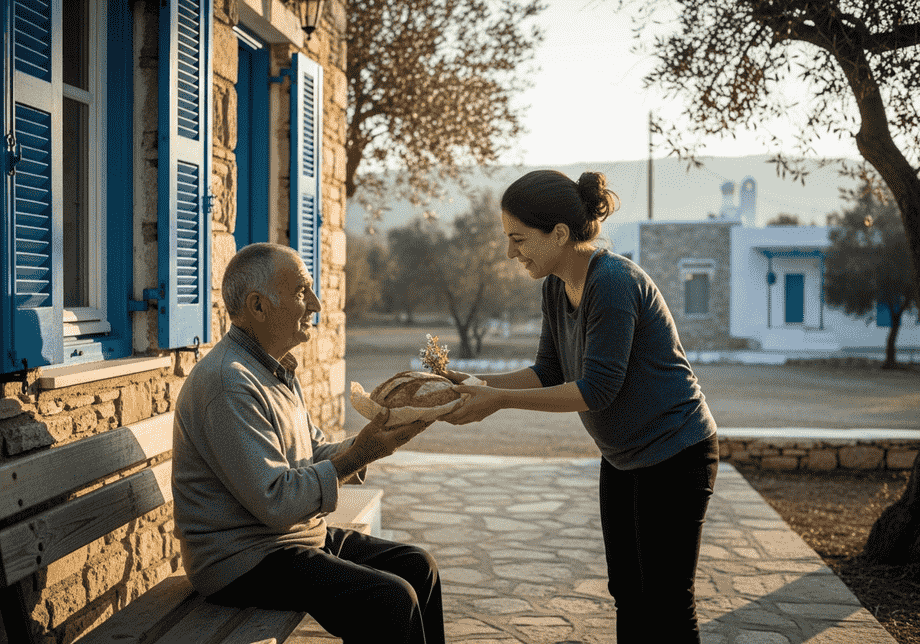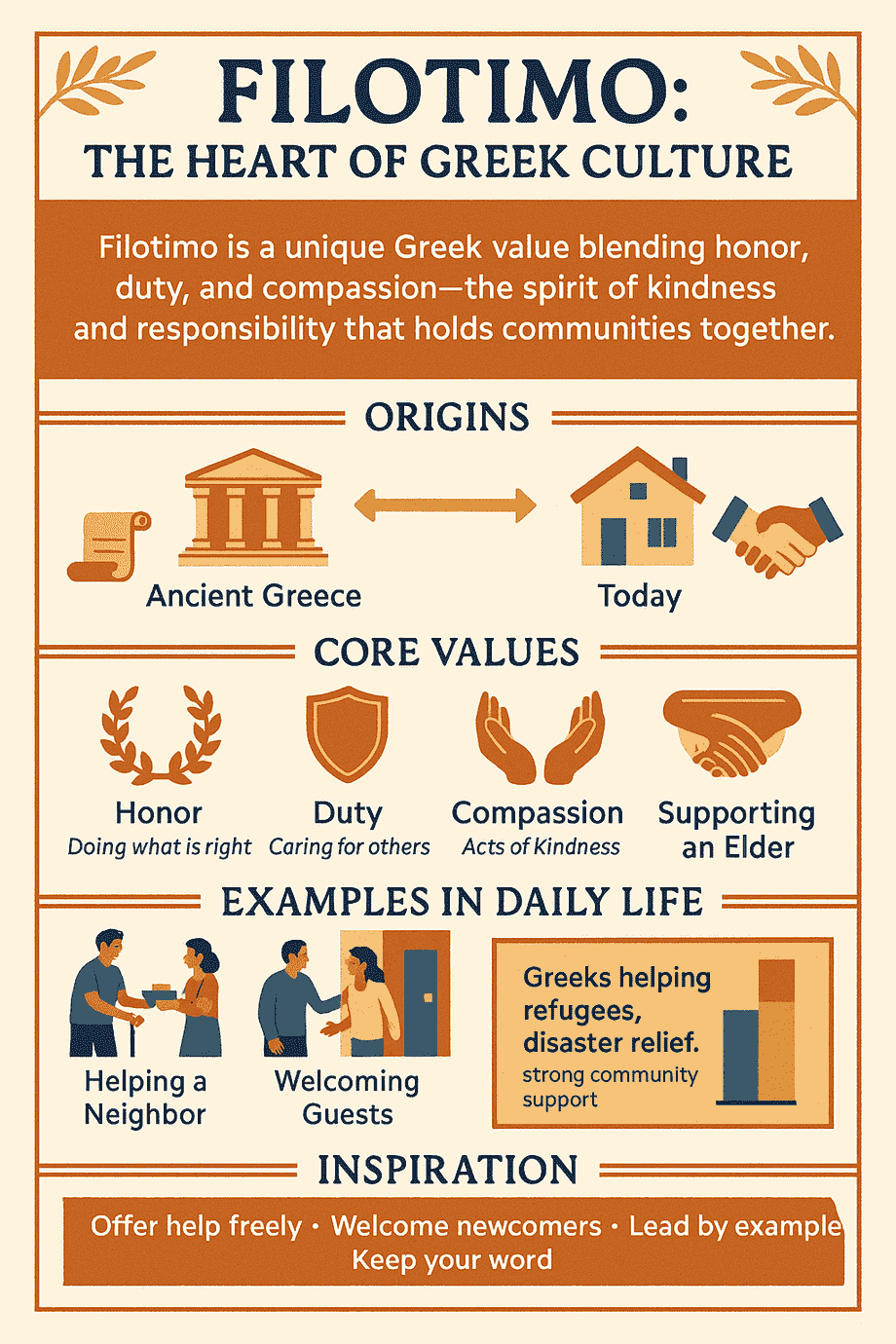Filotimo: The Heart of Greek Culture and Everyday Goodness
Filotimo isn’t just a word, it’s a spark that lights up everyday life in Greece. Locals hold it close to their hearts, and visitors often say it has no real equivalent in any other language. When you experience filotimo, you realize it’s about actions, not just definitions an open door, a helping hand, a promise kept with pride, honor and genuine kindness.
This unique sense of responsibility and generosity shapes Greek families, friendships and even strangers on the street. It’s part of what makes Greek culture so admired. Around the world, people point to filotimo with respect, inspired by the kindness and dignity it encourages. You’ll see why this untranslatable idea matters, and how it makes every day in Greece richer and more meaningful.
The Meaning of Filotimo: Beyond Simple Translation
Filotimo lives at the heart of Greek identity, yet even Greeks say it can’t be summed up in a single sentence. There’s no direct equivalent in English or most other languages. This is much more than a word, and trying to pin down filotimo with a simple definition will always fall short. Filotimo is both personal and communal, a flame of pride and humility that glows through families, neighbors, and strangers alike. To understand why this value is so deeply rooted, you need to know its ancient beginnings and what it means to embody filotimo in daily life.
Origins and Evolving Meaning of Filotimo
The roots of filotimo reach back to ancient Greece, where it began as “philotimia,” roughly meaning “love of honor.” Originally, the word often carried a sense of ambitious pride or even self-promotion. Early Greek philosophers and writers used it to describe people who sought personal recognition or distinction—sometimes in a negative light.
Over time, especially during Greece’s long periods of hardship and foreign rule, filotimo underwent a powerful transformation. The word shifted from highlighting individual glory to representing a shared moral compass. By the 4th and 5th centuries BC, it was associated with public virtue, good citizenship, and selfless contribution to society.
Filotimo became the heartbeat of resilience during war and adversity. In times of crisis like the Ottoman occupation or World War II, the idea bonded Greeks together, driving acts of courage, kindness, and sacrifice. The emotional thread tied to filotimo is woven into everything from everyday interactions to heroic deeds. Today, it’s an “unwritten code” guiding how many Greeks treat themselves and each other with integrity, dignity, and a sense of duty that feels almost instinctive.
You can try to translate filotimo as “sense of honor,” “duty to do what’s right,” or “love of doing good,” but the real meaning spills beyond those words. It’s like trying to capture the air you breathe: you know it by feeling it, by seeing it in action.
Filotimo’s Core Values: Honor, Duty, and Compassion
At its core, filotimo is made up of simple, powerful values. These are more than big ideas; they show up in everyday gestures that build trust, respect, and warmth both within families and out in the world.
Here’s what filotimo means in practice:
- Honor
Always acting honestly, keeping promises, and treating others with respect. Honor in filotimo isn’t about winning praise, but about living true to your word—even if no one is watching. - Duty
A deep sense of responsibility to help where you can. Filotimo pushes you to support your family, care for neighbors, and serve your community without hesitating or expecting a reward. - Compassion
Showing genuine care for the struggles of others. This means feeling empathy, reaching out to comfort someone in need, or offering small acts of kindness even to strangers.
Everyday examples of filotimo in action:
- Helping an elderly neighbor carry groceries, just because you noticed they needed help.
- Paying for a stranger’s coffee with no expectation of thanks.
- Standing up for someone who is being treated unfairly, even if it means taking a risk.
- Welcoming guests into your home and treating them like family.
- Donating time, money, or resources to those in crisis, sometimes even when you don’t have much to spare.
Filotimo pulses through these acts, both big and small. Sometimes it’s as heroic as a rescue in a storm, other times it’s as quiet as a heartfelt smile or a reassuring word in tough moments. When you practice filotimo, you don’t look for applause; the real reward is knowing you’ve done right by others, upholding both your personal dignity and the goodness of your community.
Filotimo in Greek Culture: A Living Tradition
Filotimo is more than just a proud Greek trait, it’s the code that colors daily life across the country. You feel it in the smallest gestures, see it ripple through family bonds, and watch it unite neighborhoods. Filotimo isn’t reserved for grand acts. It flourishes wherever honesty, respect, and heartfelt generosity appear, even between strangers. This living tradition shapes Greece deeply, linking ancient values with what it means to be Greek today.
How Filotimo Guides Behavior
Filotimo is almost like an inner compass, steering how people treat one another everywhere from bustling city streets to quiet island villages.
You’ll notice that:
- Respect defines interactions. Children learn early to greet elders with warmth and a sense of honor, offering their seat on the bus or carrying their grandmother’s bags.
- Generosity comes naturally. It’s common for Greeks to share a meal, cook extra for a neighbor, or jump in to help a friend move house without expecting anything in return.
- Hospitality is sacred. Even unannounced guests are welcomed with food, coffee, and genuine care. A simple visit often turns into a feast, because making others feel valued is second nature.
- Pride fuels kindness. Greeks take pride in helping others. Doing the right thing honors themselves and their family, even if no one is watching.
In families, filotimo is the invisible thread that calls grown children to support their parents, siblings to stand by each other without question, and relatives to rally around anyone in trouble. Among friends, it means never turning your back when someone’s in need, whether that’s during a crisis or in everyday struggles.
Real world examples are everywhere:
- Parents quietly pay the bills of a struggling neighbor.
- A shopkeeper offers free bread to someone who lost their job.
- A schoolchild defends a classmate from teasing because it’s simply the honorable thing to do.
These acts aren’t motivated by fame or reward. They flow from a sense of duty, pride, and mutual respect—this is filotimo in action.
Filotimo’s Role in Community and National Identity
Filotimo binds Greek communities together. It fosters trust, makes neighborhoods feel like extended families, and offers comfort during hard times. Across history, whenever Greece faced struggle—foreign occupation, war, or economic crisis, filotimo shined brightest.
Historically, you see it in times like:
- The Ottoman period: Greeks risked their lives to shelter neighbors, preserve traditions, and protect their culture.
- World War II: Ordinary people sheltered soldiers and rescued refugees with no thought of the risks.
- Modern economic crises: Strangers shared food, jobs, and hope. Volunteer groups formed to support the sick, elderly, and homeless.
Today, filotimo still drives countless everyday heroes:
- Neighbors check in on each other after natural disasters, opening homes to those displaced.
- When refugees arrived on Greek islands, locals offered water, food, blankets, and even their own clothes.
Filotimo shapes national pride. It’s why Greeks celebrate help given as intensely as victories won. The concept fuels solidarity, turning thousands of individual actions into a powerful wave of support. During difficult periods, filotimo is the safety net that no one sees—but everyone feels.
In Greece, filotimo is alive in every village, city, and island. It stands as proof that honor, duty, and generosity aren’t just ideals. They are the heartbeat of Greek life today, tomorrow, and always.
Why Filotimo Matters in Times of Crisis
Filotimo rises above the ordinary in moments of hardship. When disaster hits economic breakdown, war, or waves of desperate people arriving at your shores—this deep-rooted Greek value turns words into powerful action. In Greece, filotimo becomes not just a moral compass, but a collective rallying cry that transforms communities and inspires everyday heroes. During recent crises, it’s the invisible force bringing hope to those who need it, solidifying trust and neighborly bonds even when resources are scarce. You see its meaning shine brightest when life gets tough and stakes are highest.
Acts of Selflessness: Stories from Greece
When Greece faced its worst economic struggles and a historic flood of refugees, stories of filotimo burst through the headlines and quietly shaped lives behind the scenes. The world watched as the Greek islands became landing points for thousands fleeing war and poverty. What you may not have seen were the countless local acts of courage and hospitality, many done without cameras or speeches, driven simply by the Greek sense of what’s right.
- The Sergeant on the Shore
When a migrant boat shattered off the shores of Rhodes, army sergeant Antonis Deligiorgis didn’t hesitate. Instead of staying safe, he raced into the waves and pulled out twenty people, one by one including a pregnant woman who later named her child after him in gratitude. He called it his duty, but to Greeks, it was pure filotimo: risking personal safety to save a stranger, no matter the cost. - Hospitality Under Hardship
Across islands like Lesbos and Kos, people who lived on little themselves opened their doors to crowds of desperate newcomers. Villagers stripped their own children so refugee babies could be wrapped in warm clothes. Old men and women cooked massive pots of food for new arrivals, shared blankets, and made space for exhausted families on their own floors. Instead of focusing on what they lacked, they showed what it means to give with pride. - Selfless Neighbors and Volunteer Networks
During the grinding financial crisis, hospitals struggled and jobs vanished. Yet, community networks sprang up to feed the hungry, gather medicines for the sick, and offer a shoulder to those struggling with loss. Strangers paid grocery bills for families in need. Volunteers tossed lifelines to refugees at sea, risking arrest and facing tough new border policies, because walking away would be unthinkable. The everyday expression of filotimo turned neighborhoods into lifeboats. - Acts Done Quietly, With No Expectation
Not all acts reached the news. Locals in village squares quietly slipped food and money into the hands of those embarrassed to ask for help. Schoolchildren helped classmates grieving after loss, instinctively living by the quiet code of filotimo to stand by someone, no matter what.
The spirit here is unmistakable: pride in doing right, even when the system fails, and dignity in helping others without waiting for reward. Filotimo makes you the person who shows up first and leaves last, simply because it is your calling. These stories aren’t just one offs, but threads in the fabric of Greek life that hold everyone together when everything else feels like it might fall apart. In every crisis, expect filotimo to spark countless quiet and bold acts of hope—the heartbeat that keeps humanity alive.
Filotimo Beyond Greece: Lessons for Today’s World
Filotimo might have Greek roots, but you don’t need to live in Athens or on a sun-soaked island to adopt its spirit. This sense of honor, generosity, and heartfelt duty has no borders. When you bring filotimo into your life, you help create communities built on trust and respect, wherever you call home. Think of filotimo as a compass for kindness and a driver for positive change, something every society needs now more than ever.
Making Filotimo a Part of Your Life
You can start living with filotimo today, even in the smallest moments. It isn’t about big, dramatic gestures; it’s a thousand quiet choices that add up to a life of meaning and connection.
Here are a few simple steps you can practice every day:
- Look for ways to help—before you’re asked. Hold the door open for someone carrying a heavy bag or check in on a neighbor who lives alone. Anticipate needs and act without waiting for credit.
- Speak and act with honesty. Keeping a promise, however small, strengthens your word. Integrity means owning up to mistakes and doing the right thing, even if it’s uncomfortable.
- Practice small acts of generosity. Give what you can. This could be paying for someone’s coffee, making extra dinner for a tired parent, or sharing resources with those in need.
- Show respect in all relationships. Greet people warmly, listen without distraction, and recognize the dignity in each person you meet—strangers included.
- Stand up for fairness and kindness. Don’t ignore injustice. Support someone who’s being treated badly, or offer a comforting word to a friend who’s going through a tough time.
It helps to be mindful throughout your day. Notice those moments when you could act with a little extra heart. Ask yourself: How can I show more care or honor right now? Sometimes, the best moments for filotimo come when nobody is watching.
Habits that build your sense of filotimo:
- Check in on friends or neighbors often.
- Volunteer for tasks that others avoid.
- Pick up litter in your local park, even if it’s not “your job.”
- Share food, stories, or time with newcomers in your community.
- Offer help just because you want to, not for praise.
Each act is like planting a seed. On its own, it might feel small. But over time, these habits grow into a force that can shape your family, workplace, or town. In a world where isolation and division are common, practicing filotimo gives you a chance to set a different example,one grounded in connection, respect, and quiet pride.
Honor, compassion, and generosity aren’t just Greek ideals; they’re blueprints for a better world. When you choose to act with filotimo, you help that spirit travel far beyond Greece—straight into the hearts of the people around you.
Conclusion
Filotimo proves you don’t need grand gestures to shape a better world, just the daily choice to act with kindness, honor, and genuine care. You carry this Greek value with you each time you support a neighbor, show respect, or give help without being asked. Living with filotimo transforms simple moments into powerful examples of what binds communities together, especially in times when trust and hope feel scarce.
Let filotimo inspire your next step, whether that means sharing a meal, listening with empathy, or standing up for what’s right. Every act counts and every small difference plants the seeds for a kinder, stronger community wherever you live.
Take a look around you and notice who could use a little more compassion or support. Fill that space. You’ll see how the heart of filotimo can shape brighter days not just for you, but for everyone around you.
Thanks for taking the time to explore the meaning of filotimo. Share how you see or live this value in your own life, and help keep this powerful tradition going.
FAQs About Filotimo
1. What does filotimo mean?
Filotimo is a Greek word with no exact English translation. It means living with honor, doing what’s right, and showing kindness and respect to others without wanting anything in return.
2. Why is filotimo important in Greek culture?
Filotimo shapes daily life, uniting families, friends, and even strangers. It’s a core value that drives acts of generosity, honesty, and community support across Greece.
3. How is filotimo shown in everyday life?
You’ll see it when someone helps an elderly person cross the street, shares food with a neighbor, or welcomes a visitor with warm hospitality.
4. Is filotimo only for Greeks?
No. While rooted in Greek tradition, anyone can practice filotimo by acting with integrity, care, and generosity in everyday life.
5. How did filotimo start?
It began in ancient Greece as “love of honor,” but over time it grew to mean selfless action for the good of others in family and community.
6. Can filotimo help during hard times?
Yes. Filotimo shines during crises—people come together, help each other, and give support, even when times are tough.
7. How can I practice filotimo in my own life?
Look for ways to help others, keep your promises, act honestly, and treat everyone with respect and kindness. Every act, big or small, matters.










